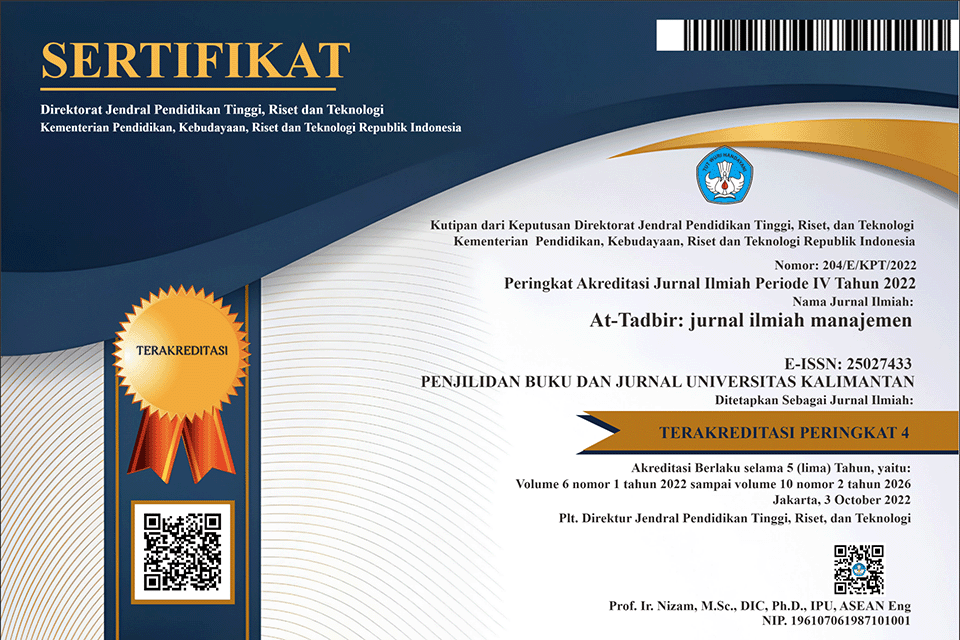Bagaimana Iklim Etis Dan Gaya Kepemimpinan Berpengaruh Terhadap Efektifitas Pemimpin?
(1) Universitas Muhammadiyah Malang
(2) Universitas Muhammadiyah Malang
(*) Corresponding Author
Abstract
This study aims to determine the relationship between ethical climate and leadership effectiveness in companies with ethical leadership variables as intervening variables. Ethical leadership is based on the diversity of situations and conditions in the company and personal values within the leader so as to allow conflict or good synergy between employees. The population of this study were all permanent employees under the medical services division, especially the nursing field, totaling 133 employees at the Muhammadiyah University Hospital, Malang. The research variables will be elaborated through a questionnaire which will be distributed to respondents based on the total amount, because all pupulation is used as research objects. Data collected will be processed using the analysis "Partial least square (PLS)". This is because the PLS analysis is able to measure variables that cannot be measured directly but are interrelated. The results showed that the ethical climate and ethical leadership and influence on leadership effectiveness at Malang Muhammadiyah Hospital.
Keywords: ethical climate, ethical leadership, effectiveness leadership
Full Text:
PDFReferences
Dasaad. 2015. Analisis hubungan kepimpinan dan kepuasan kerja terhadap kinerja karyawan pada PT. Adam Jaya. Jurnal Ekonomi Bisnis. 20 (1), 8-15.
Dirani, K.M. 2009. Measuring the learning organization culture, organization commitment and job satisfaction in the Lebanese banking sector. Human Resource Development International, 12(2), 189-208.
Dukoulou, P. and Trivellas, P. 2015. Measuring the impact of learning organization on job satisfaction and individual performance in greek advertising sector. Social and Behavioral Science, 175, 367-375.
Egan, T.M., Yang, B., & Bartlett, K.R. 2004. The effects of organizational learning culture and job satisfaction on motivation to transfer learning and turnover intention. Human Resource Development Quarterly, 15, 279-301.
Ghozali, Imam. 2011. Partial Least Squares. Konsep Teknik dan Aplikasi. Semarang : Badan Penerbit, Universitas Diponegoro
Hasanah, N. (2018). ANALISIS PENGARUH GAYA KEPEMIMPINAN DAN KOMPENSASI TERHADAP KINERJA KARYAWAN (STUDI KASUS PADA PT. FINANSIA MULTI FINANCE CABANG BANJARMASIN). At-Tadbir: jurnal ilmiah manajemen, 2(1).
Jenkins, A. K. (2009). Keeping the talent: Understanding the needs of engineers and scientists in the defense acquisition workforce. Defense Acquisition Review Journal, 16(1), 1-19.
Mayer, D. M. , Kuenzi, M. , Greenbaum, R. L. (2009). Making Ethical Climate a Mainstream Management Topic: A Review, Critique, and Prescription for the Empirical Research on Ethical Climate. Chapter to appear in D. De Cremer (Ed.), Psychological perspectives on ethical behavior and decision making. Greenwich, CT: Information Age Publishing
Rothwell, G. R., & Baldwin, J. N. (2006a). Ethical Climate Theory, whistle-blowing, and the code of silence in police agencies in the State of Georgia. (2006). Journal of Business Ethics70, 341-361.
DOI: http://dx.doi.org/10.31602/atd.v4i2.2666
Refbacks
- There are currently no refbacks.
Copyright (c) 2020 iqbal robbie, Ardik Praharjo
---------------------------------------------------------------------------------------------------------------------
At-Tadbir: Jurnal Ilmiah Manajemen is licensed under Creative Commons Attribution-Share A like 4.0 International License




